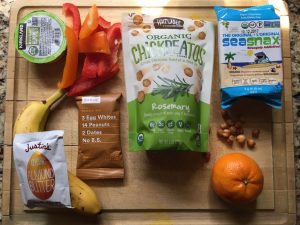As a nutritionist, I am often talking about healthy snacking with my clients. The goal of healthier snacking is to reduce sugar intake, boost fiber and protein, and increase disease fighting phytonutrients (fight with color!). By doing this, you are helping to stabilize blood sugar and achieve optimal and healthy weight.
How do you know if it is a healthy snack?
- You won’t feel hungry or headachy and tired 1 hour later
- The snack is made from whole foods
- There are no unrecognizable ingredients on the label
- There is no added sugar or artificial sweeteners in the list of ingredients
In the image below, I have laid out some of my favorite healthy snacks.
 Veggies with hummus
Veggies with hummus- Banana with almond butter
- Rx Bar – one of the only protein bars all from whole foods (eggs, nuts, dates)
- Chickpeatos (roasted garbanzo beans)
- Clementine
- Sea snax, roasted sea vegetable
You can get the full list Healthy snacks.
HOWEVER, is snacking actually good for you? The research is mixed. Higher sugar snacking (sweets, sodas) is associated with obesity, while higher quality snacks (nuts, fruit) is associated with healthy weight. In some studies, overall snacking is associated with greater BMI and body weight but a causal relationship is not established.
Snacking is on the rise, due to cultural trends, marketing and food industry growth, it is estimated that for some youth, 30% of their daily calories are derived from snacks. Snacking in teenagers leads to a greater likelihood of skipping meals. We live in a time of excess food availability. Decreasing children’s exposure to unhealthy snacks has been shown to increase fruit and vegetable consumption.The mixed research may be in part because some people eat 4-5 small meals a day while others eat 3 regular size meals with 2-3 snacks. The the line between snack and meal is sometimes not well defined. Listening to your body is good.
It is OK to feel hungry between meals. It is a natural and healthy response to intermittently fasting. Eating at regular times, 3 times a day provides healthy cues to your biological clock which improves sleep quality and overall immune health. Like exercise, fasting between meals provides a healthy “stress” on your body that allows your body to enhance physiological function to adapt to the stressor. These benefits include improved cardiovascular, learning, memory and cognitive health.
My philosophy is progress not perfection.
- Good – choose healthy snacks
- Better – eat 3 meals a day, snacking if you are growing, pregnant, b-feeding or hypoglycemic and have increase energy demands
- Best – Provide healthy meal structure and also listen to your body, eat when you are belly hungry and stop when you are satiated
For some snacking is a part of life. If people are going to snack, let’s make every bite count for health and not against.
Chapelot, D. (2011). The role of snacking in energy balance: a biobehavioral approach. J Nutr, 141(1), 158-162. doi: 10.3945/jn.109.114330
Collier, R. (2013). Intermittent fasting: the science of going without. Cmaj, 185(9), E363-364. doi: 10.1503/cmaj.109-4451
O’Connor, L., Brage, S., Griffin, S. J., Wareham, N. J., & Forouhi, N. G. (2015). The cross-sectional association between snacking behaviour and measures of adiposity: the Fenland Study, UK. Br J Nutr, 114(8), 1286-12




